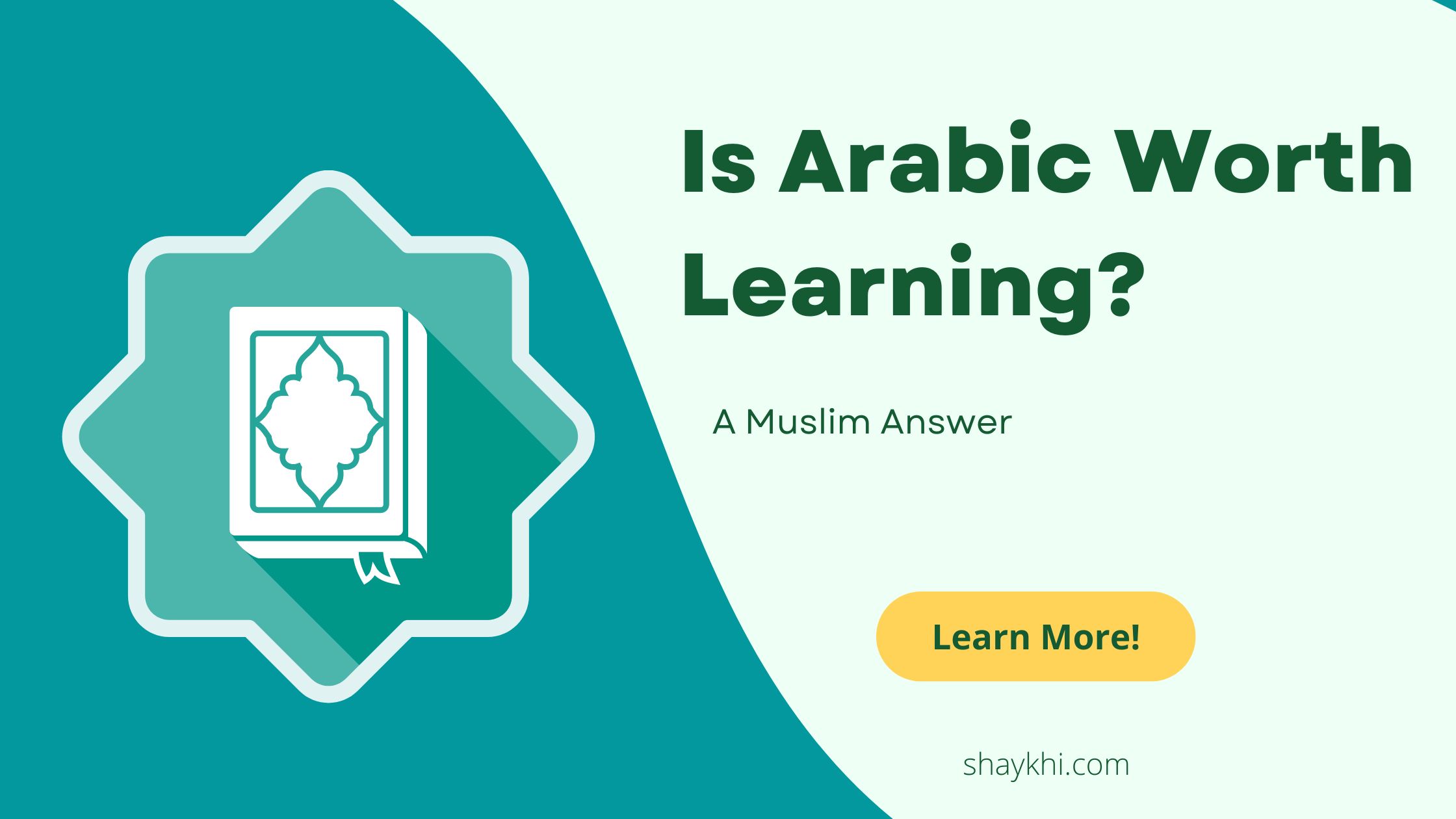Arabic is a Semitic language that is spoken by over 400 million people as their first language, primarily in the Arab world, which includes countries in the Middle East and North Africa and it is also one of the six official languages of the United Nations. It is one of the most widely spoken languages in the world and is also the liturgical language of Islam, as it is the language of the Quran.
Is Arabic worth learning?
Yes, as a Muslim, learning Arabic is definitely worth it. Arabic is the language of the Quran, and understanding it allows for a deeper connection with the holy text and a more meaningful practice of worship. It also opens up access to a vast body of Islamic knowledge, including Hadith and Fiqh, and helps preserve and connect with Islamic heritage. Moreover, it enhances the spiritual experience during prayers and rituals, making it a valuable pursuit for personal and religious growth.
God almighty said:
“إِنَّا أَنْزَلْنَاهُ قُرْآناً عَرَبِيّاً لَعَلَّكُمْ تَعْقِلُونَ”
Indeed, we have sent it down as an Arabic Qur’an that you may understand
[Yusuf: 2].
“بِلِسَانٍ عَرَبِيٍّ مُبِينٍ”
In a clear Arabic language
[Al-Shu’ara’: 195].
“قُرْآناً عَرَبِيّاً غَيْرَ ذِي عِوَجٍ لَعَلَّهُمْ يَتَّقُونَ”
An Arabic Qur’an, not crooked, that they may become righteous
[Az-Zumar: 28].
What is the goal of learning Arabic?
For every Muslim, the primary goal of learning Arabic for Muslims is to understand the Quran and connect more deeply with Islamic teachings, thereby enhancing the practice of worship and preserving Islamic heritage.
Importance of Learning Arabic For Muslims:
Learning the Arabic language is necessary because it is an individual obligation (fardu-l-ain) and a communal one (fardu-l-kifayyah)
Knowing the basic concepts of the Arabic language and memorizing some parts of the Qur’an are requirements of faith.
Imam Al-Shafi’i says:
“Every Muslim must learn the Arabic language to enable him to be diligent in performing his duties.” (Irshad Al-Fahul, p. 421).
Therefore, every Muslim must learn Arabic at least to the extent that enables him to perform his religious duties.
Arabic learning also helps us to:
1. Understand the Quran and Sunnah
The Quran was revealed in Arabic, and the Prophet, may God bless him and grant him peace, spoke in Arabic, so the only way through which we can access that knowledge directly is to know the language. It allows you to read the words of God and the words of His Prophet, may God bless him and grant him peace, without translation, which helps you find guidance and reassurance. God Almighty says:
“ألا بِذِكْرِ ٱللَّهِ تَطْمَئِنُّ الْقُلُوبُ”
“In the remembrance of God do hearts find peace?”
2. Have a correct belief and worldview
There are many words in the Quran that cannot be translated into another language without losing some of their meanings. For example, let’s take the word:
For example: the word “تقوى”
It is a central concept of the Quran and religion itself. This word is sometimes translated as fear, sometimes as piety, and even in different ways depending on the context. This is because it includes all these meanings.
The word taqwa in Arabic means fear and caution, but it also means being good, virtuous, just, and honest. It also means measurement and veneration. The definition of piety can be that one realizes the truth of God to the point that he fears Him, and thus one becomes cautious and guards against doing what does not please Him and fears his punishment. Therefore, the word in Arabic is not comparable to a single word in other languages.
3. Think by Quran
As we mentioned before, when we learn Arabic, we learn the language of the Qur’an, and this means that we will understand the concepts and terminology better and will be abler to use them.
The more we can use it, the more detailed our thoughts become. In this way, our intelligence is strengthened.
4. Enjoy Spiritual Growth
The rhythmic and poetic nature of Arabic enhances the experience of reciting the Quran and other Islamic texts. It can lead to a deeper spiritual connection and a more profound sense of devotion.
Also the understanding of Arabic allows Muslims to internalize Islamic teachings more effectively, aligning their thoughts and actions with the principles of their faith.
How long will it take to learn Arabic?
The time it takes to learn Arabic depends on several factors, including your prior language learning experience, the level of proficiency you want to achieve, the amount of time you can dedicate to study, and the specific dialect or form of Arabic you are learning. Here’s a general idea:
1. Basic Proficiency (6-12 months)
Focus: You can expect to achieve a basic understanding of Modern Standard Arabic (MSA) or a specific dialect.
Skills: You’ll learn common phrases, basic grammar, and vocabulary to handle simple conversations, read basic texts, and understand everyday Arabic.
2. Intermediate Proficiency (1-2 years)
Focus: With consistent study, you can reach an intermediate level, where you can engage in more complex conversations, read and understand more detailed texts, and have a good grasp of grammar.
Skills: You’ll be able to follow news, participate in discussions, and read intermediate-level Arabic literature.
3. Advanced Proficiency (2-5 years)
Focus: Reaching advanced proficiency takes more time and immersion, allowing you to understand and use Arabic in a wide range of situations, including formal and religious contexts.
Skills: You’ll be able to read classical texts, such as the Quran and Hadith, understand Arabic media, and engage in fluent conversation on various topics.
4. Fluency and Mastery (5+ years)
Focus: Achieving fluency, especially in both MSA and a dialect, may take several years of dedicated study and immersion.
Skills: At this level, you can fully understand, interpret, and use Arabic in both everyday and specialized contexts, including academic, religious, and literary domains.
How can you learn Arabic?
Here are 8 main steps to learn Arabic:
1- Set Clear Goals
Identify your purpose and choose the form of Arabic (Modern Standard Arabic, dialect, or Classical Arabic).
2- Learn the Alphabet
Start by mastering the Arabic alphabet and pronunciation.
3- Build Vocabulary
Focus on common words and phrases, using flashcards or language apps.
4- Study Basic Grammar
Begin with simple sentence structures and gradually advance.
5- Practice Listening and Speaking
Engage with native speakers through media, language exchange, apps or online tutors.
6- Immerse Yourself
Watch Arabic media and read simple texts to improve comprehension.
7- Take Formal Lessons
Enroll in a class or use online courses for structured learning.
You can enroll in the online Arabic course from Shaykhi Academy, where you will have the advantage of native-speaking teachers. This ensures that you learn the language from native speakers without any mistakes. They also offer advanced learning methods and fun practice techniques that will help you and your kid to learn Arabic easily. In addition, they have specialized teachers for teaching Arabic to non-native speakers. Sign up now and get your free trial class!
8- Stay Consistent
Practice daily and be patient with your progress.
Benefits of learning Arabic?
You may now be wondering why learning the Arabic language and what will I benefit from, so let me answer this question briefly…
There are 10 benefits to learn Arabic which are:
1- Read the Holy Quran perfectly
You can learn the Arabic language by reading the Qur’an in the language in which it was revealed to our Noble Messenger and the original text of the Qur’an, which is a great and enjoyable thing.
2- Preserving the Muslim religion and strengthening his connection with God:
Reciting prayers and supplications in Arabic allows for a more direct and personal connection with God, improved communication with other Muslims around the world, and the opportunity to have good company.
3- Fulfilling Islamic religious obligations and duties
This is not only at the level of correct reading of the Holy Quran, but also mastering the Arabic language helps Muslims to pray with an attached heart, which helps in a deep understanding of the verses of the Quran and Sunnah, and thus a spiritual attachment to what you do and every movement, also facilitation of Hajj and Umrah, cause understanding Arabic can make the experience smoother, as it helps in navigating the rituals and communicating with locals in the holy cities of Makkah and Madinah.
4- Discover countless cultures
Especially if you are interested in learning about different cultures and have a passion for learning more about the great Arab and Islamic cultures, learning the Arabic language opens up a wide range of cultural treasures and allows you to get to know Islamic culture closely.
5- Traveling to Arab countries without fear of communication
Being able to converse with locals in their native language will definitely enhance your experience while traveling in Arabic speaking countries.
6- Building the Islamic mind and personality:
Speaking the language of the Companions and followers affects imitating them and being influenced by their minds and morals, which enhances the values of religion and familiarity with culture and thought itself.
7- Enhancing mental skills:
The Arabic language is considered a somewhat complex language, especially in grammatical rules and terms that carry more than one meaning, and this, on the other hand, is one of its positive aspects because this enhances the mental and cognitive abilities of its learners, which contributes to improving analytical thinking.
8- Explore professional growth opportunities
The Arabic language is the language of more than 24 countries, so learning it opens the way for you to work opportunities in these countries in various fields, including teaching the Holy Quran, for example.
9- Access to Islamic Scholarship
Arabic is the language of a vast body of Islamic literature, including Hadith, Fiqh (Islamic jurisprudence), Tafsir (Quranic exegesis), and other scholarly works. Learning Arabic allows Muslims to study these texts directly, gaining insights from the original sources without relying on translations, which may sometimes vary in interpretation.
10- Enhancement of Religious Obligations
Many Islamic supplications (Dua) and phrases are in Arabic. Knowing the language helps in understanding and using these phrases correctly in daily life, enhancing the practice of Islam.
Master Arabic with Shaykhi Academy: Your Gateway to Fluency!
Are you eager to learn Arabic from the comfort of your home? Shaykhi Academy offers you the perfect opportunity to master Arabic, whether for Quranic studies, daily communication, or advanced understanding.
Why Shaykhi Academy?
- Expert Native Tutors: Learn from highly qualified native Arabic speakers.
- Flexible Scheduling: Tailor your classes to fit your busy life.
- Affordable Learning: Access top-quality education at a price that suits you.
- Global Access: Study from anywhere in the world.
Explore Our Arabic Courses:
- Noorani Qaida: Build a strong foundation in Quranic Arabic.
- Comprehensive Arabic Courses: Master the Arabic language, from beginner to advanced levels.
- Fusha Arabic Classes: Delve into Modern Standard Arabic, the key to understanding literature, media, and formal communication across the Arab world.
- Quranic Arabic Course: Enhance your connection with the Quran by learning the language in which it was revealed.
Start Your Arabic Journey Today! Whether you’re just starting or looking to deepen your knowledge, Shaykhi Academy is here to support your journey. Book your free trial now and begin your path to Arabic mastery!

Conclusion:
Arabic is one of the most important languages in the world and the most crucial for Muslims. Learning it enables you to read the Quran correctly and fulfill religious obligations. It also connects you with the Islamic Ummah, its customs, traditions, and religious teachings, and helps you develop a character more aligned with the morals of the Sahaba (companions of the Prophet) and the Tabi‘in (followers).

















































